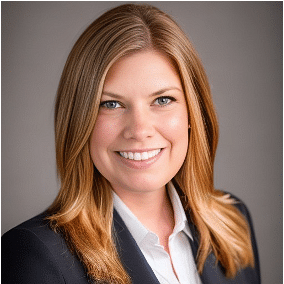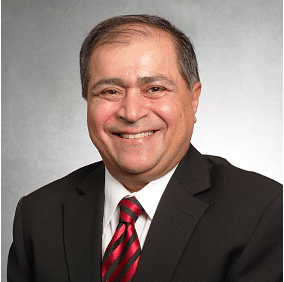By Olivia Schlabach, AVP, FINN Partners;
HIT Like a Girl Board of Advisers
Earlier this month I had the opportunity to attend CHIME Fall Forum, a convergence of movers and shakers who descended upon Valley of the Sun for three days of in-person learning and connection. As a second-year attendee of CHIME’s annual gathering, I was delighted to rub shoulders with so many who have paved the way for women like me to have a seat at the proverbial table.
In the opening keynote on Day 2, Paulette Davidson shared the story of her rise from janitor to CEO of Monument Health. Terri Couts, Chief Digital Officer of The Guthrie Clinic was honored as CHIME’s 2023 Innovator of the Year. Anna Turman, Division VP CIO for CommonSpirit Health, was awarded the CHIME Fellows Award. And Jennifer Moss, international speaker and author of The Burnout Epidemic, closed the Forum with her tips for living a happier, healthier, more fulfilling life.

Paulette Davidson presents the opening keynote at CHIME Fall Forum Day 2, outlining her rise from janitor to CEO of Monument Health.
The forum also included plenty of conversation around the challenges and opportunities to make healthcare more equitable and efficient. Didn’t make the trip to Phoenix this year? Fear not. Keep reading for my top takeaways and mark your calendars for Fall Forum 2024 in sunny San Diego.

Terri Couts, Chief Digital Officer of the Guthrie Clinic, receives recognition as CHIME's 2023 Innovator of the Year.

Anna Turman, Division VP CIO for CommonSpirit Health, receives the CHIME Fellows Award.
Lesson 1: Automation Meets Workflow
Automation, with all of its opportunities and challenges, was the talk of the Forum. One of the best points I heard from Nashville-based IT Services and IT Consulting Firm CereCore’s Focus Group was the idea that if workflows and data aren’t standardized and mapped out prior to automation you are just automating chaos.
“Providers and operational teams experience intense cognitive load challenges with hundreds of variables being presented to them in seconds,” said Kim Waters, Principal Consultant at CereCore. “Sifting through the amount of data to identify actionable insights is an opportunity for different types of AI to augment and support the workload. Automation and augmentation can help reduce the 10-20% of a clinician's day that is spent on paraclinical work. With so many intriguing use cases for AI, organizations starting this journey should identify low risk high impact areas aligned with organizational strategies as a place to start.”

Automation’s ability to tackle rudimentary tasks for clinicians so they can operate at the top of their license is a great use case—but requires some homework on the front end to ensure maximum efficiency.
Lesson 2: Staffing Remains Problematic
While the nursing shortage tops all, many organizations are inundated with IT staffing shortages. iMethods, a Jacksonville-based leader in Healthcare IT Staffing and Consulting, hosted a focus group where CIOs discussed the challenge of being attractive in a remote/hybrid environment. Teams are no longer competing for talent only in their respective cities but also across the country. Another issue raised was that leaders who have an easier time recruiting struggle with retention.
One of the comments that stuck with me from this conversation was the idea of homing in on employee preferences, as is often done with patient preferences. A CIO in this particular focus group said, “We segment our patients into certain categories, but are we doing that with our talent pool?” Factors like flexibility, remote hours, professional development and mentorship often trump higher salaries but require a lot more work to get right.

Peyman Zand, Chief Strategy Officer at CereCore
In many cases, CIOs are turning to other avenues like managed services to offset the hurdle of retaining staff. “High staff retention, though generally positive may not necessarily be so beneficial to the CIOs as they plan to roll out new technologies, especially when it comes to key innovations that hospitals need,” said Peyman Zand, Chief Strategy Officer at CereCore. “We see a trend where CIOs may hand off more of the legacy support to Managed Service providers while they recruit and retool their staff for more modern technologies.”
Lesson 3: Cost Effectiveness Is Top of Mind
Everyone’s favorite topic of conversation—finances—was not left out of the Fall Forum conversation. The October 2023 Kaufman Hall Flash Report found that while September margins declined slightly when compared to the previous month, September 2023 levels are still an improvement over 2022, which was noted as “one of the worst financial years on record.”
“Although health system margins are stabilizing and improving, there’s still a significant amount of pressure to focus on technologies and innovations that provide measurable efficiencies and cost savings,” said Bill Lewkowski, Vice President of Strategic Client Services for Nashville-based Managed Services Firm HCTec.

Bill Lewkowski, Vice President of Strategic Client Services for Nashville-based Managed Services Firm HCTec
Alternatively, there are areas that require more funding than others. “Cybersecurity is getting the largest funding increases,” said Lewkowski. With many hospitals falling prey to cyber attacks, there is more emphasis at the state and national levels to bolster defenses. Earlier this year the Cybersecurity & Infrastructure Security Agency (CISA) and the Federal Emergency Management Agency (FEMA) announced a joint effort to provide $374.9M in year two of their State and Local Cybersecurity GGrant Program (SLCGP).
That’s a Wrap
We came, we saw, and we didn’t sweat TOO much in the Arizona heat. Thank you CHIME for another year of fantastic programming. And thank you for following along. Until next time!



